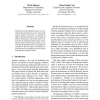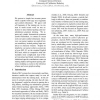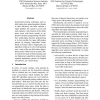126
click to vote
EMNLP
2011
14 years 1 months ago
2011
We present a simple method for transferring dependency parsers from source languages with labeled training data to target languages without labeled training data. We first demons...
108
click to vote
ACL
2011
14 years 5 months ago
2011
Dependency parsing is a central NLP task. In this paper we show that the common evaluation for unsupervised dependency parsing is highly sensitive to problematic annotations. We s...
106
click to vote
COLING
2010
14 years 9 months ago
2010
We evaluate two dependency parsers, MSTParser and MaltParser, with respect to their capacity to recover unbounded dependencies in English, a type of evaluation that has been appli...
108
click to vote
COLING
2010
14 years 9 months ago
2010
Martins et al. (2008) presented what to the best of our knowledge still ranks as the best overall result on the CONLLX Shared Task datasets. The paper shows how triads of stacked ...
139
click to vote
EMNLP
2010
14 years 11 months ago
2010
We present a new syntactic parser that works left-to-right and top down, thus maintaining a fully-connected parse tree for a few alternative parse hypotheses. All of the commonly ...
113
click to vote
EMNLP
2009
14 years 12 months ago
2009
This paper introduces a new parser evaluation corpus containing around 700 sentences annotated with unbounded dependencies, from seven different grammatical constructions. We run ...
116
Voted
NAACL
2010
14 years 12 months ago
2010
The Brown and the Berkeley parsers are two state-of-the-art generative parsers. Since both parsers produce n-best lists, it is possible to apply reranking techniques to the output...
92
Voted
ACL
2010
15 years 4 days ago
2010
We present a simple but accurate parser which exploits both large tree fragments and symbol refinement. We parse with all fragments of the training set, in contrast to much recent...
109
click to vote
ACL
2010
15 years 4 days ago
2010
Incremental parsing techniques such as shift-reduce have gained popularity thanks to their efficiency, but there remains a major problem: the search is greedy and only explores a ...
115
click to vote
TCS
2010
15 years 14 days ago
2010
Robustness, the ability to analyze any input regardless of its grammaticality, is a desirable property for any system dealing with unrestricted natural language text. Error-repair...




